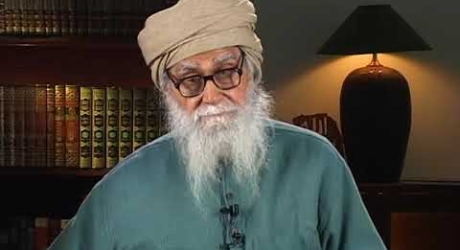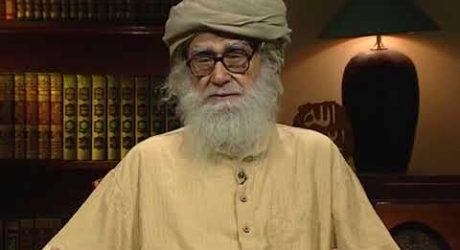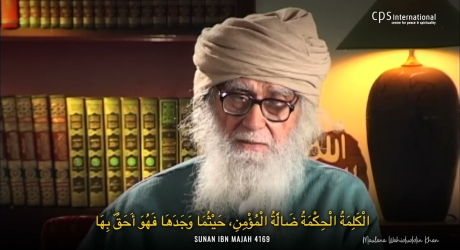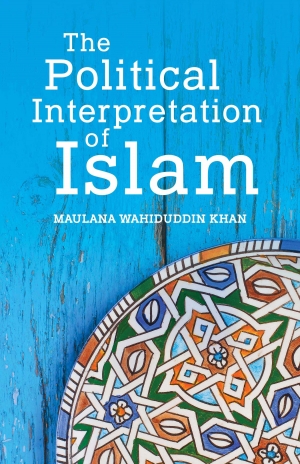Islam is a universal religion that addresses the whole of humanity. The Islam of the Quran is a universal religion which belongs to everyone, but the Islam which Muslims have fashioned for themselves is that of a nationalistic heritage which belongs to them and no one else. The Quran teaches that Islam means submission, but the Muslims have—in their commentaries – turned their religion into a source of pride. The Quran tells us that salvation depends upon a person's actions, but, from the interpretations Muslims have made of the Quran, one would think that it is enough to be a purely nominal Muslim to earn salvation. The Islam in the Quran teaches one to become conscious of one's faults and seek to correct them, but from what Muslims have made of the Quran, one would think that Islam teaches one to pick on the faults of others, ignoring one's own.
Maulana Wahiduddin Khan gave a universal interpretation of religion, God-centered religion, which is the voice of and in harmony with human nature. He explained that God-centred religion means the law of nature. This law controls the whole world, and the crux of this law is submission. Therefore, the religion of the universe is based on submission. Submission to God is the only religion for both man and the universe. Every creation in the universe is compulsorily submitting to its Creator. However, man is free. If he behaves in any way, whether right or wrong, it is by his own choice. As he submits to God and behaves righteously, of his own choice, he will be amply rewarded for it. God's prophets were sent to exhort human beings to follow this course.
Featured Articles
Featured Videos
FAQs
Everything in the universe—the sun, the moon, the stars—have all completely subjugated themselves to God’s will; they cannot make the slightest deviation from the path that God has ordained for them. Similarly, all other elements in nature function in obedience to the laws of nature laid down for them by the Creator. The entire universe has surrendered to God, the Lord of the Universe.
But there is a difference between the status of man and that of the physical world. The physical world has been given no option but to submit to God, whereas man has been given free will, so that he may opt for either good or bad ways. To this end he has been given a thinking faculty, and a conscience with which to make moral judgements for himself. He has the ability to accept and follow certain principles in life or refuse to do so. He is not bound by fixed laws like all other created beings. He has been given freedom of thought, option and action.
It is through this freedom of choice that man is being tested. But after being given a thinking faculty, a conscience and an ability to judge between good and bad, man was not just left to his own resources. God did not leave man in a world where there was no way to find the Truth. Divine provision for him went much further. To see how God gave His guidelines to humankind, we have to go right back to the beginning of creation. God created Adam, the first man—whom He had made not just an ordinary mortal but also a prophet—and taught him everything that He wanted from man, so that human beings would not be left without proper direction or guidance. From time to time thereafter, God sent prophets to the world—the last of these being the Prophet Muhammad—so that human beings, who tended to stray, could be recalled to the path of virtue.
Source: Spirit of Islam April 2020
God created Adam, the first man. He commanded the Angels and the Jinn, whom He had created before Adam, to prostrate themselves before him. The Angels hastened to obey this divine commandment, but Satan, the chief of the genies, held himself aloof and did not prostrate himself. When God asked him to explain his disobedience, he replied, ‘I am better than him; You created me from fire, while him you created from mud.’ (Quran 7:12). Since Satan was ready to prostrate himself before God, but not before Adam, he was declared beyond the pale and sentenced to everlasting damnation.
Clearly, in human relationships there are always two main possible courses of action: either to tread the path of acknowledgement of the superiority of others and to demonstrate our submission to them—as shown by the Angels—or to assert our own superiority over others, with the resulting friction—as shown by Satan. To this day the sons of Adam have to decide whether to side with the Angels, or to become the Devil’s comrades, saying of their neighbours: ‘I am better than he.’ The drama which was enacted at the time of Adam’s creation is still being played out over and over again, in our day-to-day existence, only on a much larger scale.
At some point or the other during our brief sojourn on earth, we are sure to encounter an ‘Adam’—one to whom something is due from us, be it only a kindly word. On all such occasions, God makes His will quite plain to us, albeit silently, that, in obedience to Him, we must bow to this Adam. Those who tread the path of the Angels will understand God’s wishes and will give their ‘Adam’ his rightful due, hastening to yield pride of place to him.
It is only people who act in this way who are the true and faithful servants of God. As such, they will find their eternal abode in heaven. Those who follow the example of Satan, and refuse—out of conceit and arrogance – to bow before the ‘Adam’ who has entered their lives, are rebels in God’s eyes. They will be cast into Hell along with Satan, to burn there for all time.
Man being God’s servant must prostrate himself first and foremost, before his Master. But in everyday situations, it often happens that in his immediate environment there are individuals who have some claim upon him or some right to assert over him. These are the ‘Adams’ before whom he must bow at the behest of the Almighty. This is a test, which God sets for man in life. It is an exacting test, because although human beings are quite prepared to bow before God, His superiority being unassailable, they find it difficult to acknowledge the rights of other ordinary individuals, who, they feel are in no way superior to themselves. This is when the ‘Satan’ in them comes alive and drives them to the perversity of ignoring, or denying the rights of others. They refuse to bow before Adam, despite this being a commandment of that very deity before whom they regularly prostrate themselves. Like Satan before them, they refuse to bow to those whom they consider inferior to themselves. It is the same superiority complex, the same hubris, that held Satan aloof when the Angels were prostrating themselves before Adam—whether they are conscious of it or not—which prevents them from carrying out the will of God.
Source: Islam: The Voice of Human Nature
The universal interpretation of religion is an understanding of the creation plan of God. God created an ideal world which was perfect in all respects. He ordained that this ultimate world be inhabited by impeccable ideal human beings. To achieve this target, God first settled man on Earth giving him complete freedom. The present world is a selection ground for this grand project. Here, it is being observed as to who makes proper use of his freedom and who misuses it. At the end of history, those who have abused their freedom will be rejected, and those who may have exercised it judiciously will be selected and settled in heaven. Contrary to atheist thinkers who term the concept of paradise a beautiful idealization of human wishes, it would be more accurate to call it a beautiful interpretation of human history.
A study of the Quran reveals that there is only one product desired by the Creator through various activities of history. This product is called a godly man (rabbani insaan) in the Quran (3:79). That is to say, that the real goal of God’s creation plan is the development of divine personality within an individual—a “man created in God’s image.” As long as such divine (rabbani) individuals continue to be born, the course of history will not come to a halt. Only when such people cease to exist, the present period of history would be brought to an end. Subsequently, its second period, the life hereafter, would commence in the next eternal world.
Source: Interpretation of Human History








